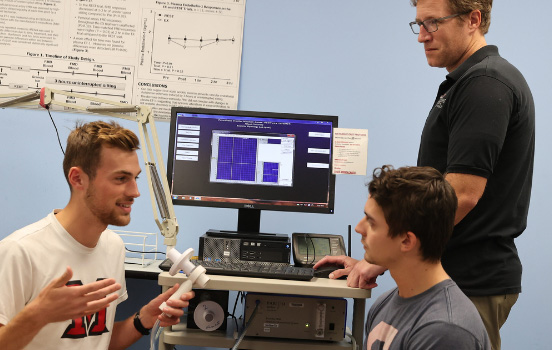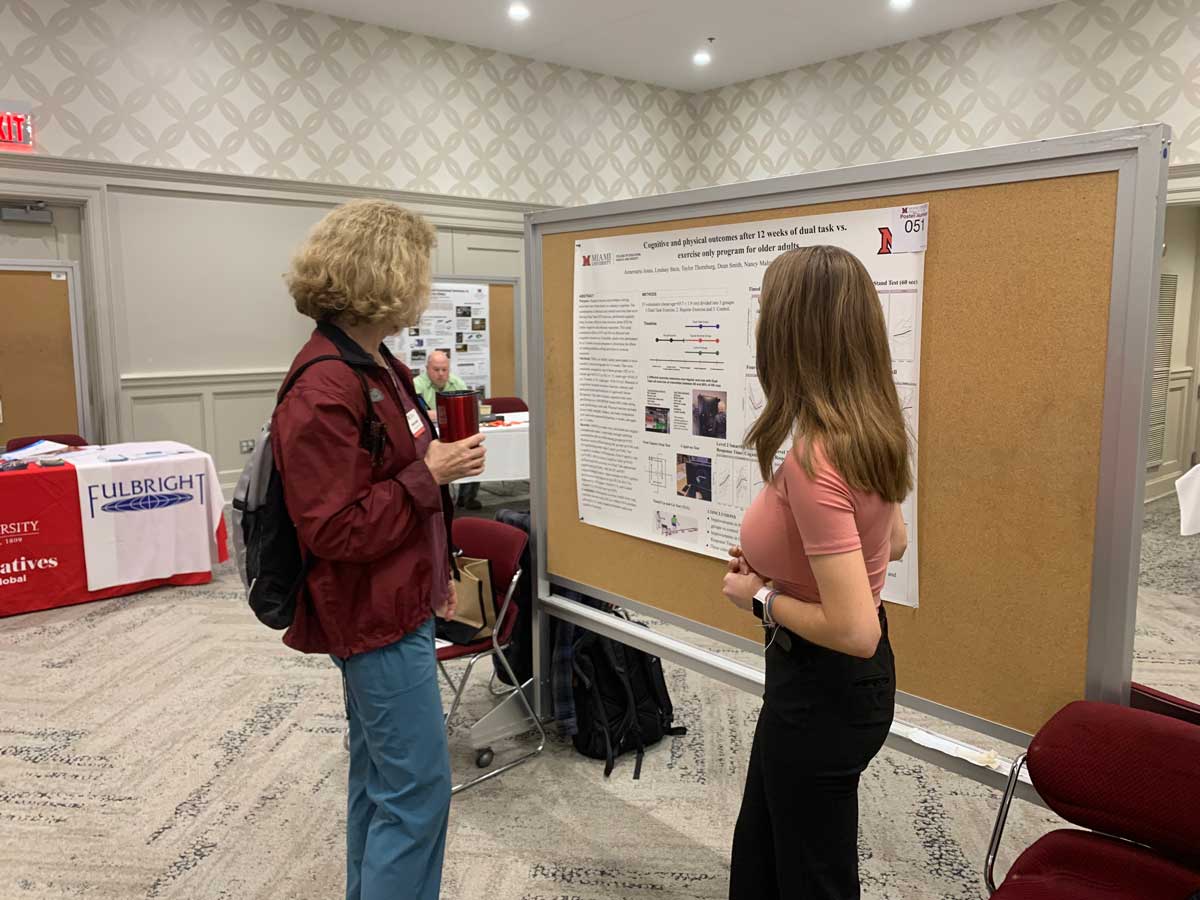How Miami Students Get Started in Research
See how KNH students begin their research journey, starting with shadowing and growing into presenting at conferences, joining programs, and even co-authoring papers.

Hear from KNH faculty about how students can begin their research journey as early as their freshman year.
See how KNH students begin their research journey, starting with shadowing and growing into presenting at conferences, joining programs, and even co-authoring papers.
Learn how getting involved as early as freshman year builds skills, leadership, and experiences that set KNH students apart for graduate school and beyond.
KNH students can take advantage of Miami’s many programs, funding opportunities, and campus resources to support their research involvement and success.
 The University Summer Scholar (USS) program is open to Miami students completing their sophomore or junior years (having earned at least 60 credit hours).
The University Summer Scholar (USS) program is open to Miami students completing their sophomore or junior years (having earned at least 60 credit hours).
The USS program's primary goals focus on student-centered learning through mentored research. This 9-week summer program aligns with Miami's focus on offering “active, engaged educational experiences for our undergraduates
The program's purpose is to encourage students to develop their capacity to construct knowledge by reflecting on their experience and crafting their ability to articulate the meaning of their discoveries. By enabling our undergraduates to conceive and carry out a summer independent research or other creative activity under the supervision of an individual Miami faculty mentor, it heightens the intellectual level of the Miami learning environment.
The ORU helps Miami students get involved in research, creative work, and scholarly activities across campus. Through programs, events, and awards, the office connects students with mentors, highlights outstanding projects, and supports undergraduates in exploring their academic and professional passions.
Learn More About the USS Program
For more research information and opportunities, please visit the Office of Research for Undergraduates webpage.
I was lucky enough to work alongside Dr. Helaine Alessio, where we studied the effects of short-term electric bike use on continuous blood glucose levels in healthy adults. I worked on the project as a summer scholar, attended the Undergraduate Research Forum hosted by Miami, and even traveled to Indiana to present our data at the Midwest American College of Sports Medicine Conference in October 2022. I was also fortunate to have an article written about the work I’ve done as an undergraduate researcher and our study. I have had the absolute best undergraduate experience.
Alexandra Bagg
Kinesiology major, Pre-Medical Studies co-major, Nutrition minor
Faculty in Kinesiology, Nutrition, and Health conduct research across diverse fields including physiology, nutrition interventions, global health, and biomechanics. This section highlights a sampling of ongoing research efforts within the department. Students can explore these areas to find opportunities for collaboration and mentorship.
Helaine Alessio, Ph.D., studies how physical activity influences health at the genetic and cellular levels. Her research explores gene expression and health outcomes such as tumor growth, blood lipids, and oxidative stress in both animal and human models. She collaborates across disciplines, including projects on speech, hearing, and exercise, and has received support from the National Institutes of Health, National Institute on Aging, and the National Cancer Institute. In partnership with colleagues, she co-authored the book Health and Hearing. Students working with her gain experience in multidisciplinary research that connects physiology with broader health applications.
Kevin Ballard, Ph.D., investigates how lifestyle factors—such as exercise, diet, and sedentary behavior—affect vascular function and glucose metabolism. His research highlights the health risks of prolonged sitting and post-meal metabolic disturbances, while exploring how physical activity and nutrition can counteract these effects. In the KNH cardiometabolic lab, his team examines strategies to reduce cardiovascular disease risk and improve metabolic health. Students working with him gain hands-on experience in lab techniques, study design, and research presentation while contributing to projects with real-world health applications.
Bill Berg, Ph.D., is currently focused on research to understand how the human central nervous system (CNS) functions proactively to preserve postural stability. Specifically, he is studying anticipatory postural adjustments (APAs). APAs are initiated in advance of self- and/or externally-induced postural or movement perturbations.
For example, when reaching for a book on a shelf, muscles in the trunk and legs activate in advance of muscle activity or movement in the shoulder and arm. Or when catching an object, APAs stabilize the limb and body just prior to the catch.
His recent work has revealed that APAs commence earlier when muscles are fatigued, and that this functional adaptation to fatigue is definitely coordinated by the CNS. He also studied how the CNS copes with uncertainty about load in terms of generating the anticipatory muscle activity necessary to successfully catch an object. Recent work has revealed that when object weight is unknown to a person, the CNS prepares for a much heavier than average object, thereby affording the greatest chance of catching the object regardless of its weight.
He is, also interested in applying our enhanced understanding of role of the CNS in postural control in order to develop more effective and specific therapeutic exercise. Further research interests include aging and mobility, and attention and human performance.
Research Grant from the College of Education, Health and Society, Miami University.
Paul Branscum, Ph.D., is a health promotion and public health scholar focused on improving quality of life through healthier behaviors and community interventions. His research uses theory-based approaches to predict and change behaviors related to childhood obesity, nutrition, and wellness. He designs and evaluates public health programs in schools, families, and communities, often emphasizing survey design and behavior change theories. Students collaborating with him engage in applied public health research that answers practical questions about what works, when, and for whom.
Alex Claiborne, Ph.D., studies exercise bioenergetics, focusing on how oxygen uptake reflects energy use during physical activity. His research explores how exercise “dose”—intensity, duration, and frequency—affects metabolism, pregnancy outcomes, and obesity management. His work spans cellular to whole-body levels, including projects on maternal-fetal health and real-time energy expenditure during exercise. At Miami, he integrates his research into the Human Performance Laboratory, offering students training in body composition analysis, indirect calorimetry, study design, and data presentation.
Karly S. Geller, Ph.D., aims to research the promotion of multiple health behaviors (i.e., healthy lifestyle) to prevent and control chronic disease among unique youth and young adult populations. She strongly believes health promotion research has the potential to relieve the public of cancer, obesity, and other chronic diseases; however, the approach must holistically target the lifestyle behaviors of youth - the future public.
The multiple health behavior of collegiate athletes versus non-athletes is funded by the Committee on Faculty Research (CFR), Grant to Promote Research ($2,875). This examination will be among the first to specifically examine the potential clustering of multiple health behaviors among collegiate athletes, as well as indicate the underlying influences that motivate these behaviors. Focus groups to inform fall 2012 data collection began June/July 2012.
Ohio Health Action and Research Training (HART) is funded by the Education, Health, and Society Small Research Grant Award ($1,750). The "Health Action" element of the HART program aims to describe the social- and community-level influences on the lifestyle behaviors of youth. "Health Action" includes activities to educate and empower youth to be conscious and active members of their communities, and to advocate for healthy change(s). The "Research Training" element involves youth-led research, generating rich data collection, and contributing to the development of future scientists. Data collection began in fall 2012.
The environmental influences on college students' health behaviors project is funded by the Undergraduate Summer Scholars (USS) Appointment. This research project examines the Miami University campus environment as it relates to Miami undergraduates’ lifestyle, health, and quality of life. Data collection began in June 2012.
The Kansas youth gardening project is in the manuscript and grant development phase through partnerships with health promotion researchers at Kansas State University. I have confirmed commitments from Dr. David Dzewaltowski and Dr. Richard Rosenkranz to collaborate in a 3-day workshop this June, including research planning, manuscript development, and grantsmanship brainstorming/development. These efforts are funded by the Education, Health, Society Mutual Mentoring Grant ($450).
Development and testing of a comprehensive lifestyle metric relative to cancer incidence and mortality is a RO3 grant proposed to the National Institutes of Health. The proposal aims to empirically compare various methods of aggregating several health behaviors into a comprehensive lifestyle metric relative to cancer incidence, cancer mortality, and overall mortality. The grant was scored and resubmitted in October 2012.
Jay Kimiecik, Ph.D., explores in his research how positive experiences, such as flow and enjoyment, support healthy living and sustainable well-being. His work investigates why and how activities that foster meaning and positive emotion can enhance health across the lifespan in contexts like schools, workplaces, and communities. Through writing and scholarship, he seeks to connect well-being science with everyday practices that help individuals and groups thrive.
Beth Miller, Ph.D., RDN, LDN, FAND, focuses on community nutrition and health, particularly in low-income communities facing high rates of obesity and food insecurity. Using community-based participatory research, she partners with local organizations to design interventions that improve access to healthy foods, such as linking Miami’s organic farm with food pantries. She also collaborates on projects addressing obesity prevention in preschoolers and culturally tailored nutrition interventions. Her work provides students with opportunities to engage directly in community health research with real social impact.
Paul Reidy, Ph.D., through his research, focuses on how physical activity—or inactivity—impacts metabolism and skeletal muscle. Using both human and animal models, his team investigates how reduced activity contributes to diabetes risk, muscle loss, and metabolic dysfunction, and how recovery or interventions like electric bikes may reverse these effects. He also studies protein nutrition and the role of skeletal muscle stem cells across the lifespan. Students in his lab are deeply involved in every stage of research, from designing studies to collecting and analyzing data, often leading to presentations and publications.
Jon Stavres, Ph.D., examines how the cardiovascular system responds to exercise, especially in individuals with cardiometabolic conditions. His work investigates the exercise pressor reflex—how blood pressure and blood flow adjust during physical activity—and how these responses differ in healthy adults versus those with metabolic syndrome. Supported by NIH funding, his research also explores treatments to reduce exaggerated blood pressure responses, including studies on GLP-1 therapies. He is committed to student mentorship; his trainees have published papers, earned academic awards, and advanced to graduate and medical programs.
Kyle Timmerman, Ph.D., studies the connections between physical activity, aging, and inflammation. His work explores how exercise training reduces skeletal muscle inflammation and its links to chronic diseases such as cardiovascular disease, diabetes, and sarcopenia. His lab was among the first to evaluate certain inflammation-regulating proteins in human muscle, findings that have important clinical implications. Supported by the National Institute on Aging, his research involves both undergraduate and graduate students in clinical studies, giving them opportunities to investigate how exercise promotes healthier aging.
Mark Walsh, Ph.D., centers his research on sport biomechanics, including balance, postural control, and the mechanics of running and jumping as they relate to performance and injury prevention. Beyond the lab, he leads transformative study abroad programs where students explore the world while studying sport and movement—from trekking the Inca Trail to Machu Picchu to hiking to Mt. Everest Base Camp, and traveling through Asia and the Middle East. His work blends rigorous scientific research with experiential learning in global contexts.
Hear about some of our faculty research projects on our Reframe podcast.